Travelling to Egypt? This Egypt travel tips guide will give you a detailed rundown of absolutely everything you should know before visiting Egypt. Including what to wear, tipping culture, scams, and loads of other useful hacks.
Egypt is awesome. Seeing its magnificent monuments and the mighty Nile will no doubt leave a lasting impression on you.
If you’re reading this, then there’s are good chance you have either booked your flights to Egypt or you’re seriously considering going. Either way, that’s great! You’ve come to the right place and are in good hands.
You won’t regret deciding to travel to Egypt. I know you will have a fabulous time.
How do I know that? Because you’re here reading this article!
You’re doing the right thing by researching and arming yourself with information. This is guide covers literally everything you need to know before visiting Egypt.
This is a very honest (and sometimes brutally honest) guide. No sugar-coating. My intention is not to be a Debbie Downer. I simply want to prepare you, so you will have a wonderful time because there won’t be any nasty surprises.
You won’t find a more comprehensive guide out there on how to prepare for and what to expect in Egypt. I’ve literally poured all my knowledge (and then some!) into this guide because just like you, I was both excited about going to Egypt but also very anxious and probably a bit paranoid too.
With that in mind, here’s everything we’ll cover. Plus a bonus tip at the end you won’t want to miss!
Looking for something in particular? Use this table of contents below to jump around using the links.
Table of Contents
-
- Why You Should Go to Egypt
- Is it Safe to Travel to Egypt?
- Is Egypt Safe for Solo Female Travellers?
- Survival Arabic Language Guide
- When Should You Go to Egypt?
- What is the Safest Way to Travel Around Egypt?
- Top 24 Egypt Travel Tips You Should Know Before You Visit Egypt
- Conclusion
Why You Should Go to Egypt
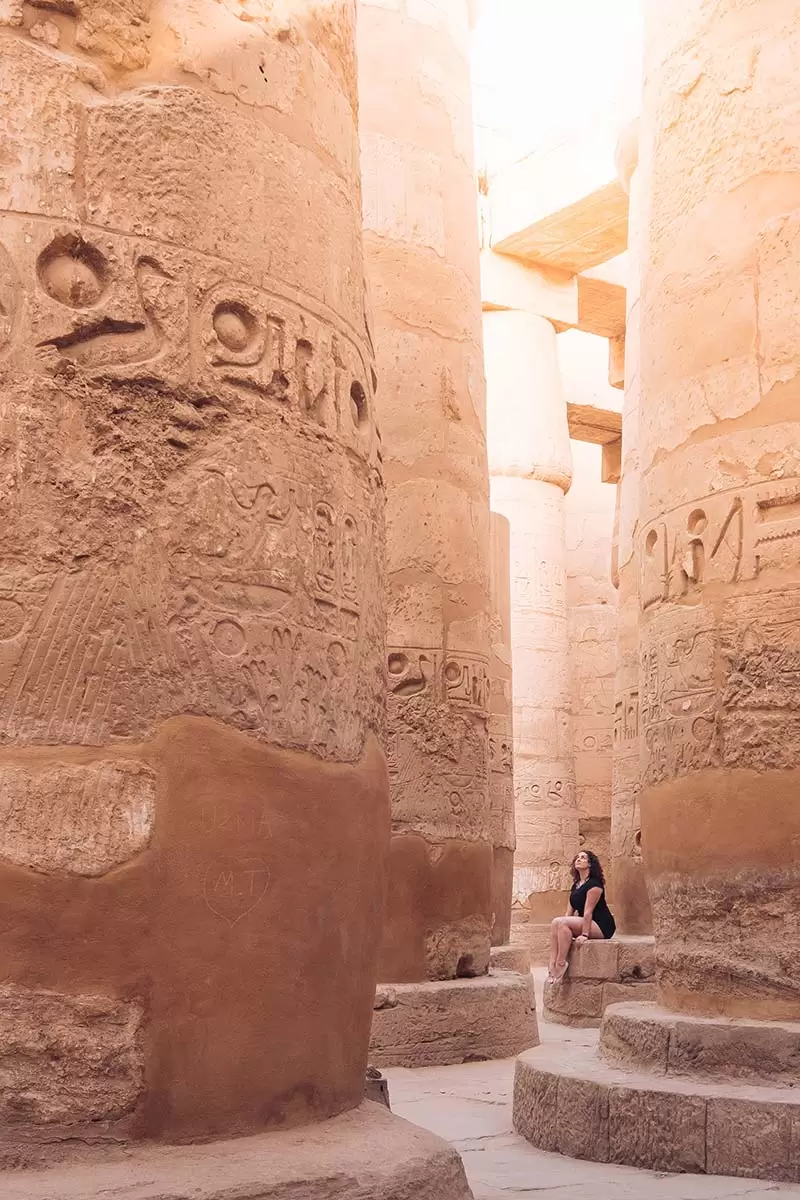
Karnak Temple
There’s so much to love about Egypt and nothing comes close to experiencing it in in person and not through a TV screen. The history, the temples, the smells, the heat, the sand, the Nile and the moment when your eyes finally gaze up at the Pyramids of Giza.
All along the Nile you can trace the Ancient Egyptians through history as you visit their impressive and carefully decorated temples and tombs.
Learning about the Ancient Egyptians, how they lived, their beliefs, inventions, and actually seeing their creations is something that will stay with you forever. Egypt is simply a marvel that should be experienced by everyone.
Is it Safe to Travel to Egypt?
Yes! It’s much safer than the media may lead you to believe. Which is probably why you’re here reading about this Egypt travel tips guide
As an Aussie, I always check the Australian Smart Traveller site for travel warnings. This is the equivalent of the travel warning list by the U.S Department of State for American citizens.
While Egypt is currently listed with a Level 2 travel warning (go to page 4) (True as of August 19, 2018), it’s important to remember that governments will always err on the side of caution.
There are four levels used. Where Level 1 means ‘exercise normal precautions’ and Level 4 means ‘do not travel’.
As you can see, this particular warning doesn’t mean you shouldn’t travel. It just means that certain areas are better off being avoided and you just need to be more cautious when visiting them. That’s up to you to decide what you’re most comfortable with.
As of August 2018, the areas of Egypt which are flagged as dangerous are:
- The Sinai Peninsula (with the exception of travel to Sharm El-Sheikh by air) due to terrorism.
- The Western Desert due to terrorism.
- Egyptian border areas due to military zones.
The site goes on to suggest ways in which you can reduce any risk:
- Stay alert in locations frequented by Westerners.
- Avoid demonstrations and crowds.
- Obtain comprehensive medical insurance (get a free quote here) that includes medical evacuation.
- Enroll in the Smart Traveler Enrollment Program (STEP) to receive Alerts and make it easier to locate you in an emergency.
- Follow the Department of State on Facebook and Twitter.
- Review the Crime and Safety Report for Egypt.
- U.S. citizens who travel abroad should always have a contingency plan for emergency situations. Review the Traveler’s Checklist.
There are other ways you can ensure your safety and help you to feel more confident with your decision to travel to Egypt. This is covered in a later section.
Because of all the negative attention Egypt has received, tourism has fallen drastically which is great for us travellers but not so great for the locals who depend on the tourist dollar.
With fewer visitors, there are also fewer scammers and smaller crowds at famous attractions. So, there is a silver lining.
On a more personal note, I felt safe during my entire Egypt trip which started in Cairo and went all the way down the Nile to Abu Simbel near the Sudan border.
If I can offer any addition peace of mind, it’s that tourist attractions are generally the safest areas to be in in Egypt as they are heavily guarded.
In addition to this, the locals who I met in hotels, restaurants, supermarkets, souks and the Telecom store where I bought my local SIM card, were all very helpful, kind, and friendly.
Is Egypt safe for solo female travellers?
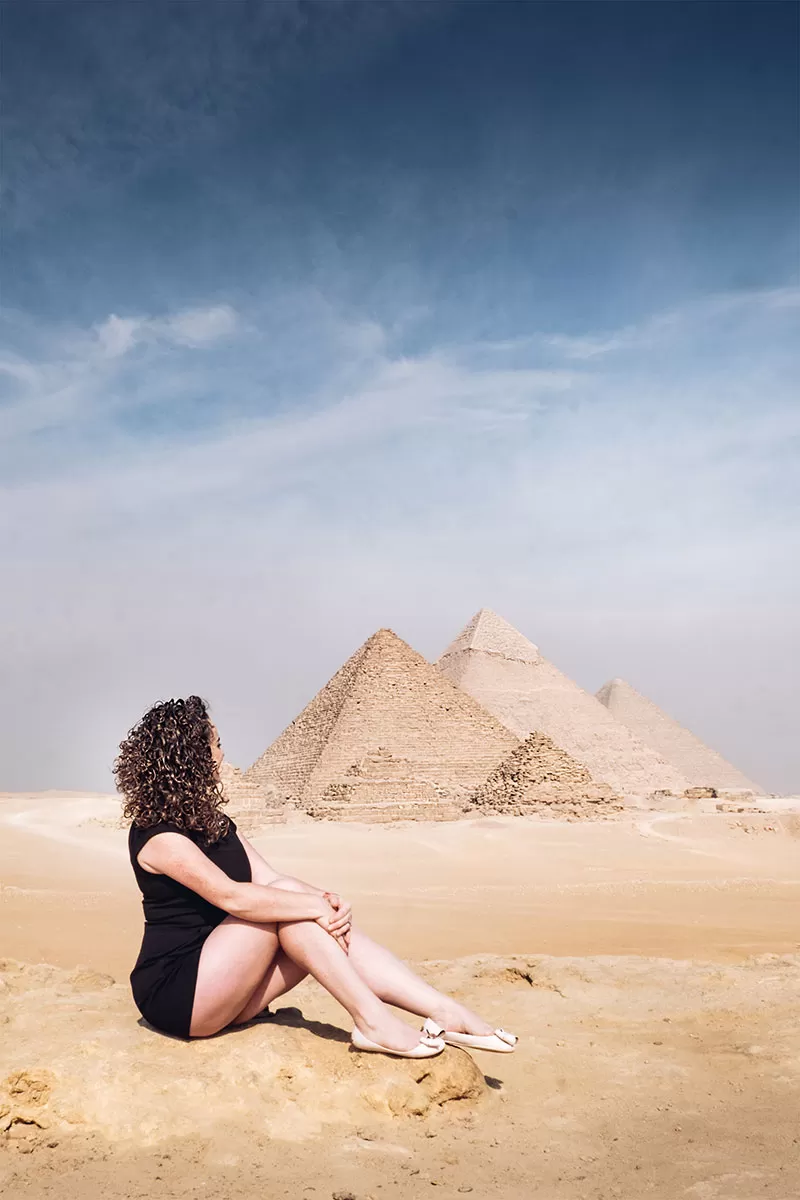
Admiring the Pyramids
Yes! While Egypt is safe, as a female, you will feel a little bit uncomfortable. This feeling will come mainly in open public places such as walking down the street and in souks.
It’s in these places that you will find men loitering, either by themselves or with a couple of other men. I can only describe this as people watching as most of the time they are sitting on plastic chairs and watching the world go by, including us.
If you’re female, you will receive a lot of looks. In my experience they were harmless. If anything, it just made me feel a bit self-conscious.
Sometimes these men will try to start talking with you or guess where you’re from (they’re very good at getting this right, by the way). Somehow they can tell an Australian from an American just by looking or listening to us speak. Very clever cookies.
It’s at this point, you should do what a local Egyptian man told to me, and that is, to ignore them. Don’t even look at them. This will be enough to discourage them. It might seem like you’re being rude, but ultimately it will protect you.
I was told that the seemingly harmless conversations that start with something like guessing where you’re from, will eventually lead into being invited into their home, shop or restaurant, where they will offer you tea (a traditional welcoming custom), then after some more small talk, they will present you with something and insist you buy it. If you decline, they will get angry.
Okay, so I just painted a terrible picture, but it’s important to be aware of these things. I experienced this first-hand and didn’t know what had happened until my local guide told me that it’s a very common ploy.
Not all men are like this by the way. Just some that give the rest a bad name.
Let’s move on, shall we?
Survival Arabic Travel Phrase Language Guide
Knowing some Arabic ahead of travelling to Egypt is such a game changer. When you can show that you speak a bit of the Arabic language and can recognise certain keywords, this will give you an extra layer of protection, especially when it comes to dealing with money.
Not only will you feel more in control, but locals will appreciate and respect your efforts to learn their language.
Here are 13 useful Egyptian Arabic words and phrases you should learn and use:
- Hello – salam / marhaban / ahlan
- Peace be with you – As-salāmu alaykum – Even though this literally means ‘peace be with you’, it is a commonly used greeting. The response would be Alaikum Salaam, meaning ‘upon you be peace’.
- Thank you – shukran
- Please – min fadlak (if you’re a male), min fadlik (if you’re a female)
- You’re welcome – Afwan
- Yes – aywa, No – lā, Ok – Mashi
- How much is this? – bi-kam da. You can say, I’ll pay 100 – Enna hafda meeya. Incidentally, if you say ‘meeya meeya’ (’100, 100′) this means ‘perfect’ or ‘really good’.
- It costs too much – Da ghali awi
- I would like… – momkin
- I want – Enna iza (if you’re a female) or Enna ayez (if you’re a male). To negative the sentence, add ‘mish’. For example, ana mish iza/ayez (I don’t want)
- I don’t understand – ana mish fahem
- Go away – Em’shee
- Pyramid – Haram. Most Egyptians don’t understand the word “Pyramids”, so make sure you learn the Arabic word for them, especially if you’re taking a taxi there. Haram also means. The strict translation of the Arabic word ‘harim’ means (a prohibited place) and is from the verbal root ‘harama’ (prohibited), designated as ‘haram’ (a pyramid). (Source)
For more Arabic phrases, get my free Arabic travel phrases guide here.
When Should You Go to Egypt?
Between June and August, the temperature in Egypt is unbearable. While you may have the luxury of quiet tourist attractions and more hotel options, to be honest, in that heat you won’t want to do anything but relax in a pool somewhere.
The best time to visit Egypt is in Spring. The weather is pleasant and the major attractions such as the Pyramids of Giza, Aswan, and Luxor are still fairly quiet.
You’ll also benefit from cheaper hotel prices, especially if travelling either side of the high season which is December to February.
Avoid traveling during Ramadan.
What is the Safest Way to Travel Around Egypt?
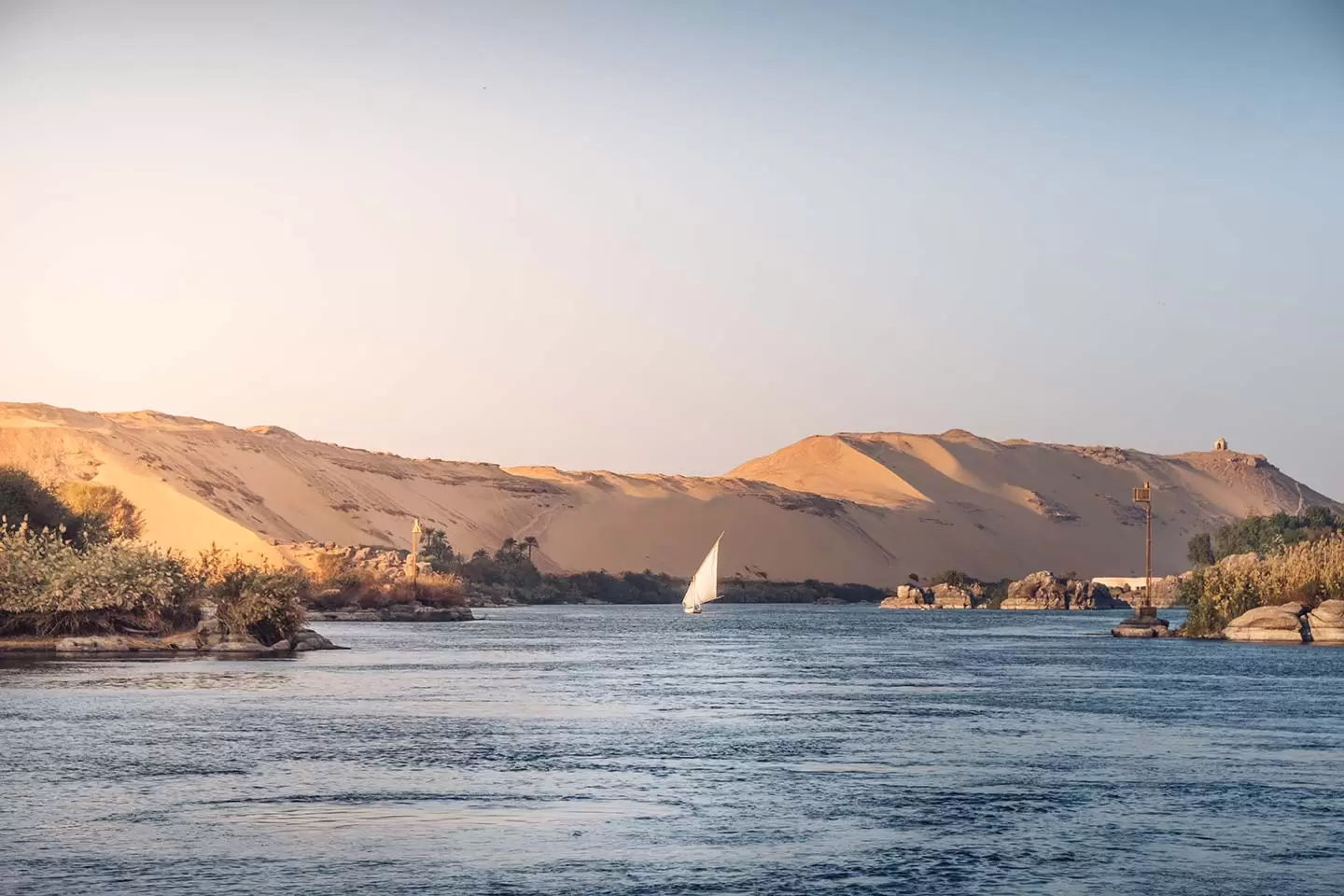
Cruising down the Nile at sunset
This is probably my top tip in this guide. It’s not Earth shattering, but it made all the difference to me and was the only way I could see myself travelling around Egypt and finally fulfil my childhood dream.
Go on an organised group tour!
To simplify and avoid overthinking everything, I knew that I had to travel with an organised group tour. That way I would have a local guide with me, I wouldn’t have to worry about transportation and other logistics and I could just concentrate on having a good time.
Choosing Topdeck to go to Egypt with was a no brainer, for two reasons. I’d already travelled with them before around Outback Australia and really rated my experience with them. The accommodation, transportation, guide and organisation was all spot on. Plus, I met some wonderful people that I’m still friends with.
The second reason (which might sound a bit silly) was that they are an Australian company, which I knew would put my dad’s mind at ease. I knew he would be super worried about me going. Even me living in London makes him worry!
By the way, remember that Egyptian guy I mentioned earlier who warned me about talking to strangers? That was our Topdeck tour manager, Ramzy. Top bloke!
Ramzy gave a bunch of useful tips, a language guide (on behalf of Topdeck), and was basically a kind of bodyboard who protected us from negative experiences and scared off a few scammers. This made all the difference. If you’re curious, I went on the Egypt Express tour. Book your Egypt tour here.
Now, let’s get into the niggity gritty of the everyday realities of travelling in Egypt.
Top 24 Egypt Travel Tips You Should Know Before You Visit Egypt
Health
1. Water
The tap water in Egypt is heavily chlorinated and tastes terrible. It’s okay for brushing your teeth with, but don’t drink it. Especially if you have a sensitive stomach. Buy bottled water. It’s easy to get and only costs 5 EGP (0.28 USD) for a 1-litre bottle.
2. Food and Upset Stomach
You’re in a foreign place with foreign food, diarrhoea will happen. To help prevent this, again, buy bottled water and check the seal isn’t broken. Avoid eating salads, raw vegetables, unpeeled fruit, and meat that isn’t thoroughly cooked. Don’t buy food from street vendors that don’t have running water. If you want an ice-cream, check that it hasn’t melted and been refrozen. If you do get an upset stomach, take diarrhoea relief tablets and drink plenty of purified water with fresh lime.
3. Heat and Hydration
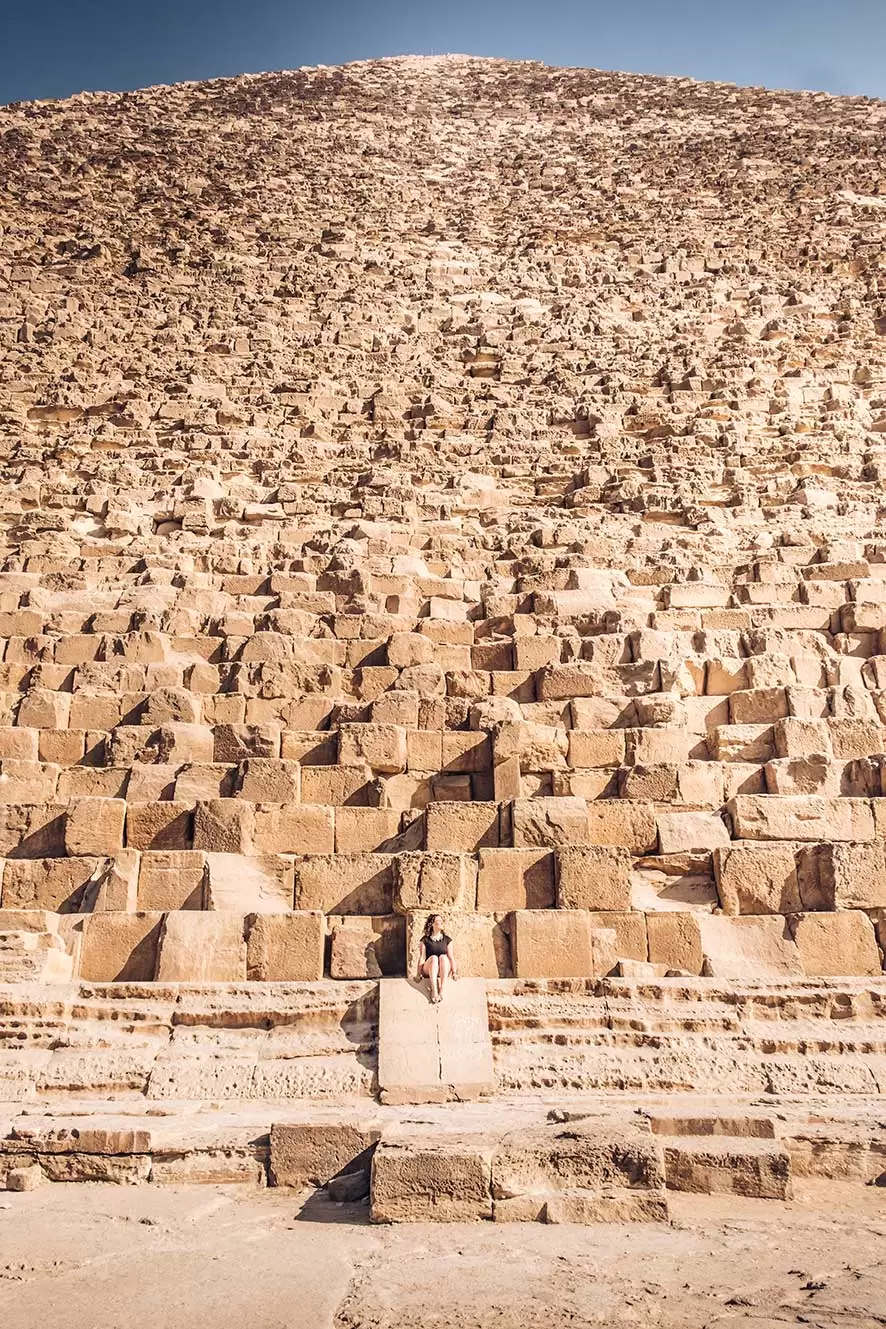
Looking up at the Great Pyramid of Giza
Egypt gets hot, obviously. You’re in the desert! Dehydration, sunburn and heat exhaustion are common, especially in Upper Egypt. As your sweat evaporates you may not realise how dehydrated you are.
If you’re travelling outside of winter, then I highly recommend wearing loose-fitting clothes made of natural fibre. Keep up your fluids up by carrying around this travel bottle and add a bit of extra salt to your food to replace salts lost in sweat. Pack electrolyte tablets to take just in case you feel unwell.
If you need further medical assistance, Egyptian pharmacists generally speak English and can be trusted to provide sound advice and help you find a doctor if needed.
4. Vaccinations
Officially, visitors to Egypt do not require any vaccinations unless you’re coming from an infected area. However, there are some vaccinations you should get or have topped up as a precaution.
Check with yourr GP what they recommend. Beyond ensuring your tetanus and polio is up to date, other common recommendations include getting vaccinations against typhoid, Hepatitis A and B, and rabies. Rabies is a problem throughout Egypt, so avoid touching stray animals such as cats, dogs, monkeys, and bats.
Money and Valuables
5. Currency
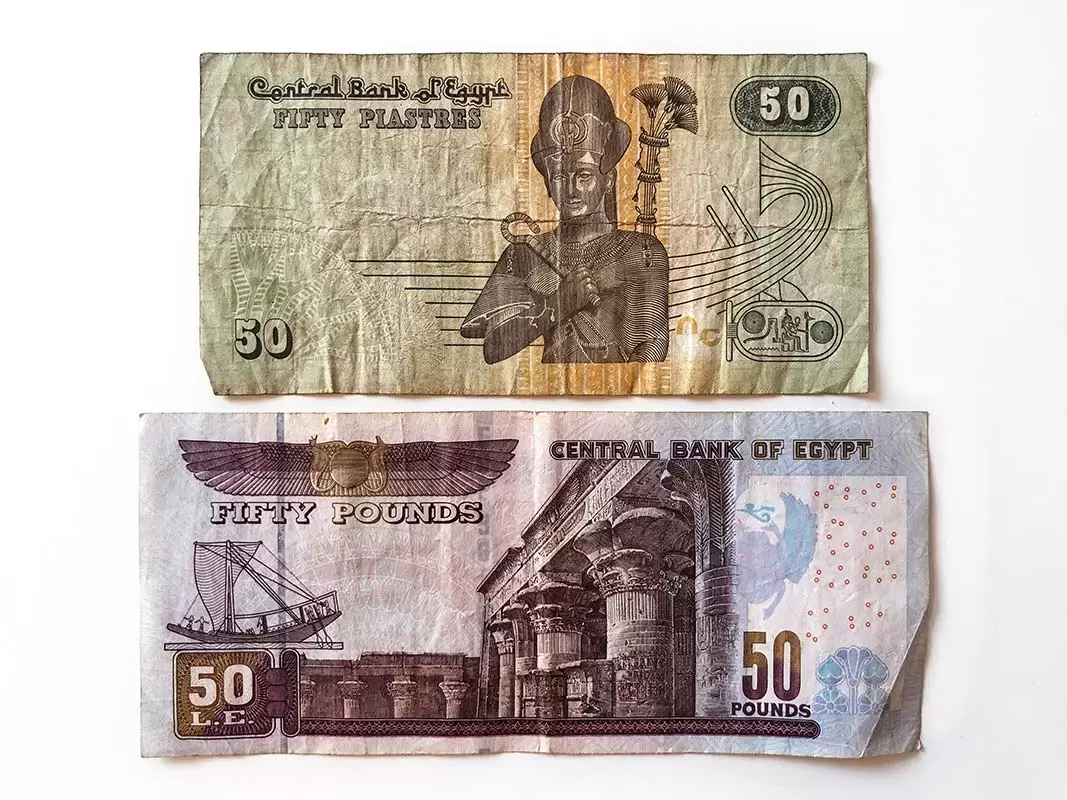
Remember the difference between 50 Piastres (top) and 50 Egyptian Pounds (bottom)
The unit of currency used in Egypt is the Egyptian pound, written £E or LE. The Egyptian pound is divided into piastres (pt). My top tip is to recognise the difference between the 50 pt against the 50 Egyptian Pound notes since they are very different in value.
Make sure that if you’re given change or are paying for something, that you’re not duped into thinking that 50 piastres (or cents) is the 50 Egyptian pounds note. This is a common scam that is used on unsuspecting tourists. When I found out about this, I made sure I kept both denominations on me so I could tell them apart. Compare the difference of the 50 pt and 50 LE in the photo above.
6. Tipping
Another word to add your vocab is ‘baksheesh’, which means ‘tip’. You’ll hear this one a lot and it will be expected for anything and everything. Tipping locals for their services is expected and a way of life in Egypt.
Many Egyptians are paid such low salaries that receiving tips is an important part of their income. But rest assured you won’t have to fork out much.
In restaurants, it’s normal to round up the bill or give 10 per cent directly to the waiter. Smaller tips (0.25 piastres to 1 EGP) are given to the likes of lavatory attendants, porters, and anyone willing to bend the rules a bit like letting you enter a site after hours or taking a photo in a restricted area.
While the rules are often bent in Egypt, authorities are cracking down on certain things (like being able to take a photo inside King Tuts tomb) with hefty fines. Don’t risk offering money just to get your way.
7. Haggling and Bargaining
One of the best things to do in Egypt is to visit a souk market. When browsing comes to buying and you ask, bi-kam da? (How much is it?) be prepared to bargain hard or walk away. As a general rule, offer one third of the asking price and expect to pay half.
8. Nothing is free
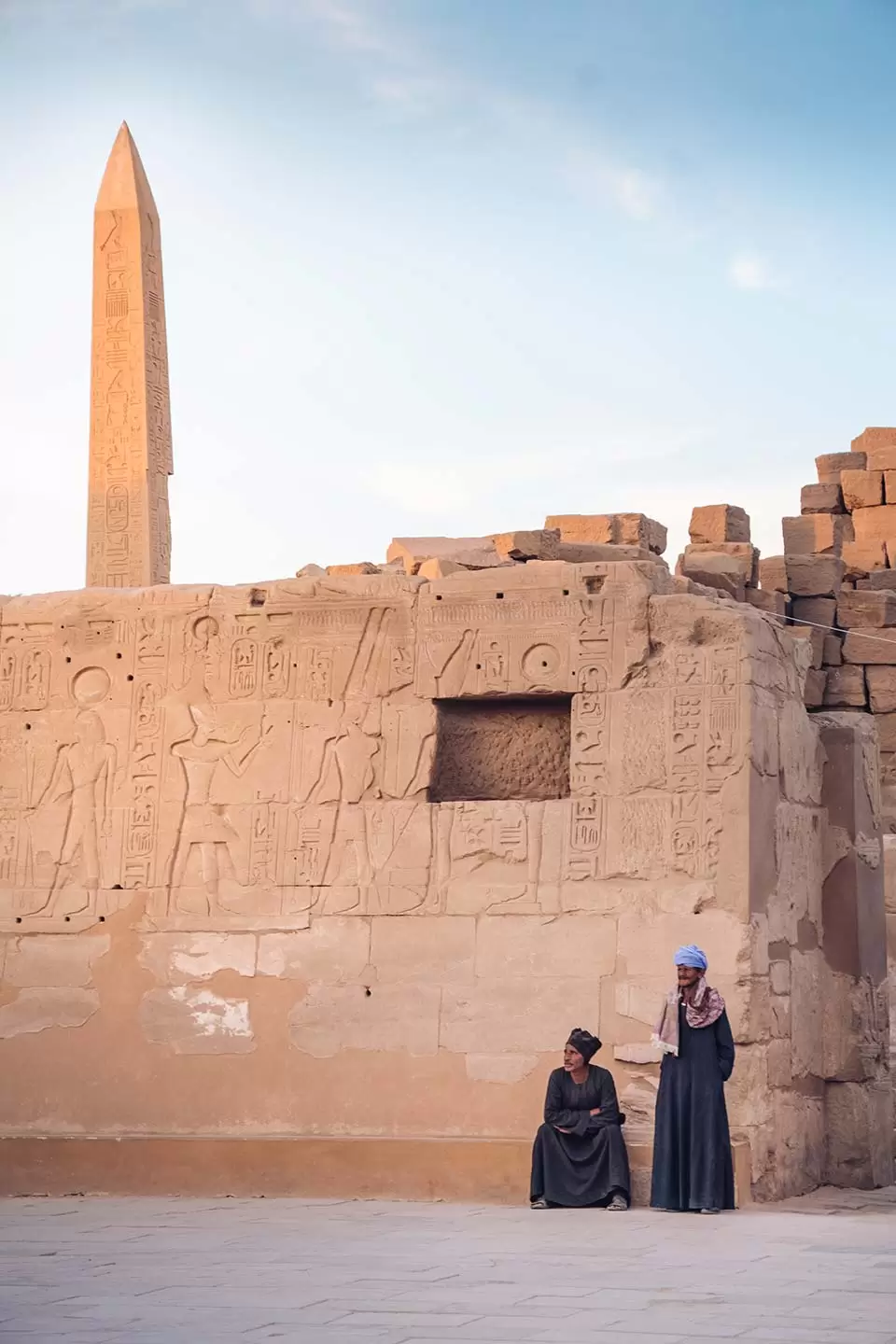
Taking a sneaky photo at Karnak Temple without being spotted
Want to take a photo of a camel at the Pyramids? If the owner catches you look, he will probably demand to be paid.
I learned this lesson the hard way. I was at least 20 metres away when I was spotted taking a photo of a camel resting. It’s up to you if you choose to offer the owner something and if you feel like you’ve done something wrong.
A similar incident happened when I was at Philae Temple. Three men were talking amongst themselves and with the temple behind them I thought it would make a great shot. With at least 50 metres between us , I took the shot. They spotted me and came over and offered to have a group photo. By this point I knew the drill and was happy to give them a little baksheesh.
9. Belongings
It goes without saying that you should always keep your valuables with you. Decide on whether or not you feel comfortable leaving your passport, laptop or iPad in the hotel room safe or if you’re better off keeping it on you. Using a PacSafe is a great option if you want to leave stuff in your room and there is no safe available.
If you go on a tour, don’t leave anything valuable on the bus, even if the driver is around. They can’t be responsible if something happens.
Planning a trip and need travel insurance? Get a free quote from World Nomads here.
What to Wear
10. Clothing
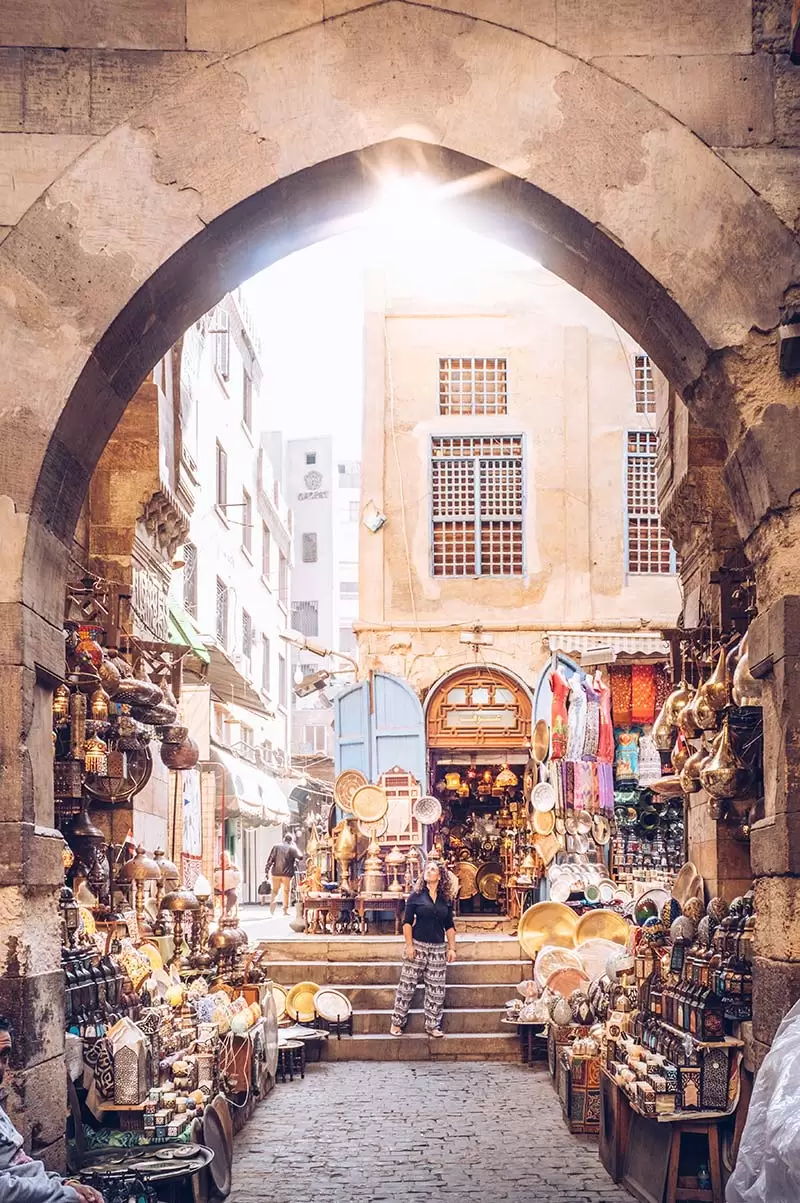
Khan el-Khalili market in Cairo
Egypt is dusty, sandy, and dirty. Your clothes will dirty easily and you’ll be washing your hair most nights. Be prepared to rinse out your clothes each night (this will do the trick) or pack extra items to wear.
So, what should you wear? As a general rule, wear loose-fitting clothes that are made of breathable material.
Ladies, it’s a bit more complicated for us. While Egypt is one of the more liberal Islamic countries, it has become more conservative in recent years with many women wearing a hijab or headscarf. Female tourists aren’t obligated to wear these but you may feel more at ease doing so, especially in mosques.
As a general rule, avoid showing your chest, shoulders or legs below the knees.
At this point you’re probably looking at my photos wondering why I didn’t cover up my legs, and you’re right! I did pack longer dresses, but when Ramzy told the group that it’s ok to wear shorts and normal summer attire when visiting monuments such as the Pyramids and the temples along the Nile, I felt comfortable in taking his advice.
The only exception he made was when visiting mosques, markets or souks. Which is why you’ll see me wearing long pants in the photo above in Khan el-Khalili souk in Cairo.
If you’re a female travelling alone, place ring on your wedding finger, this will show respectability.
11. Footwear
However hot and tempting it maybe to wear flip flops, with all the dirt, sand and grime present, I recommend wearing closed toe shoes.
You’re going to be doing a lot of walking in some pretty unclean areas and the last thing you want is having dirty feet all day.
Getting Around and Transportation
12. Visa
You need a visa! For Americans and Aussies, and a few other countries, you can either apply in advance for an Egypt e-Visa, or queue at the border for a visa on arrival.
For most travellers, the visa will cost roughly $USD25 (single entry, valid for 30 days) or $USD35 (multi-entry).
Since I travelled with Topdeck, they organised my visa once I arrived. All I had to do was bring American Dollars to pay for it. Only American Dollars or Egyptian Pounds are accepted. In addition to your visa, ensure your passport is valid six months beyond your planned date of entry.
13. Taxis
Taxis are cheap and easy to use. Simply go to a main street and wave your hand, that’s it. They even have Uber if you prefer! Just be sure he follows the GPS.
Before jumping in the taxi, agree on the price beforehand and stick to it. Not matter what reason they come up with. For getting around Cairo, you can expect to pay 50 to 80 EGP. (2.70 – 4.50 USD).
If you’re staying in Downtown Cairo, getting to the Pyramids should only take 30 minutes, but Cairo has very busy roads so it can take 60-90 minutes.
There are three kinds of taxis in Cairo: Black Taxis, Yellow Taxis and White Taxis. Black taxis are the oldest ones. Most are without a meter and without air-conditioning. White taxis are the modern equivalent of black taxi. They have a meter and air-conditioning. Yellow taxis are professionally run and can be booked over the phone but are the most expensive.
I recommend getting a white taxi and bargaining hard.
14. Air travel
With raised safety concerns in Egypt, some airlines like British Airways are becoming more strict with what you can take in your carry-on luggage or even in your checked luggage.
I flew both ways with British Airways but they only had an issue when returning to the UK. They had very strict guidelines on what size lithium batteries were allowed on board.
A bunch of us were fuming when we were forced to leave behind expensive powerbanks which we weren’t reimbursed for or given alternatively means of keeping them. To give you an idea, this is the one I had to part with. *sniff*.
Air France, who were also flying that day but didn’t have this rule. Check with your airline ahead of travelling so you’re not caught out and left out of pocket.
15. Cairo Airport
Cairo Airport is unlike any airport you’ve experienced. Upon arrival, everything seems pretty standard until after you go through passport control.
Once you pick up your luggage and head to the exit, there will probably be a massive long queue that wraps around the luggage collection hall. Guarding the exit is one or two men who will look you up and down and decide if they want to check your luggage.
Since we were with a Topdeck escort who came to help us get a visa and take us to the hotel, he was on familiar terms with the airport staff and was able to get us through quickly.
Once we got through to the other side, our escort disappeared briefly to hand back a permit he was given in order to come and meet us inside. This is just another reason why travelling with an organised tour is great.
If, at the end of your trip you leave via Cairo Airport, be prepared for three separate security checks; one as soon as you enter the airport at the entrance, one at customs, then another at the gate. The first one is where they’ll flag any illegal objects like my poor powerbank.
16. Crossing the road
Crossing the road in Cairo is a skill. If you’ve ever been to Rome and stared down a driver then confidently walked out into a busy street, then you’re well-prepared for Cairo.
If locals see you struggling to cross, they will either let you join their own crossing convoy or come and assist you.
If you’re still too nervous to go it alone, you have some other options for crossing the road:
- Wait for a lull in the traffic before crossing (this may take a while).
- If possible, cross where there is only 1 or 2 lanes of traffic. Don’t stop in the middle of the road between the two lanes either. Cars will drive dangerously close to you while you wait for the other lane to have an opening.
- Ask someone to join them as they cross. If they can’t understand English, simply smile and indicate to the other side of the road.
- Find a policeman to help you, there are plenty around.
17. Driving
Whilst driving from Cairo to Luxor during the night, I noticed that many drivers didn’t have their headlights on. This is totally normal and nothing to be concerned about. Egyptians believe they see better this way.
When a car is approaching, they’ll flash their lights to let them know they’re there. Some drivers may keep their fog lights on. If you’re wondering, our Topdeck driver kept his headlights on.
Cultural Tips and Other Useful Tips
18. Photography
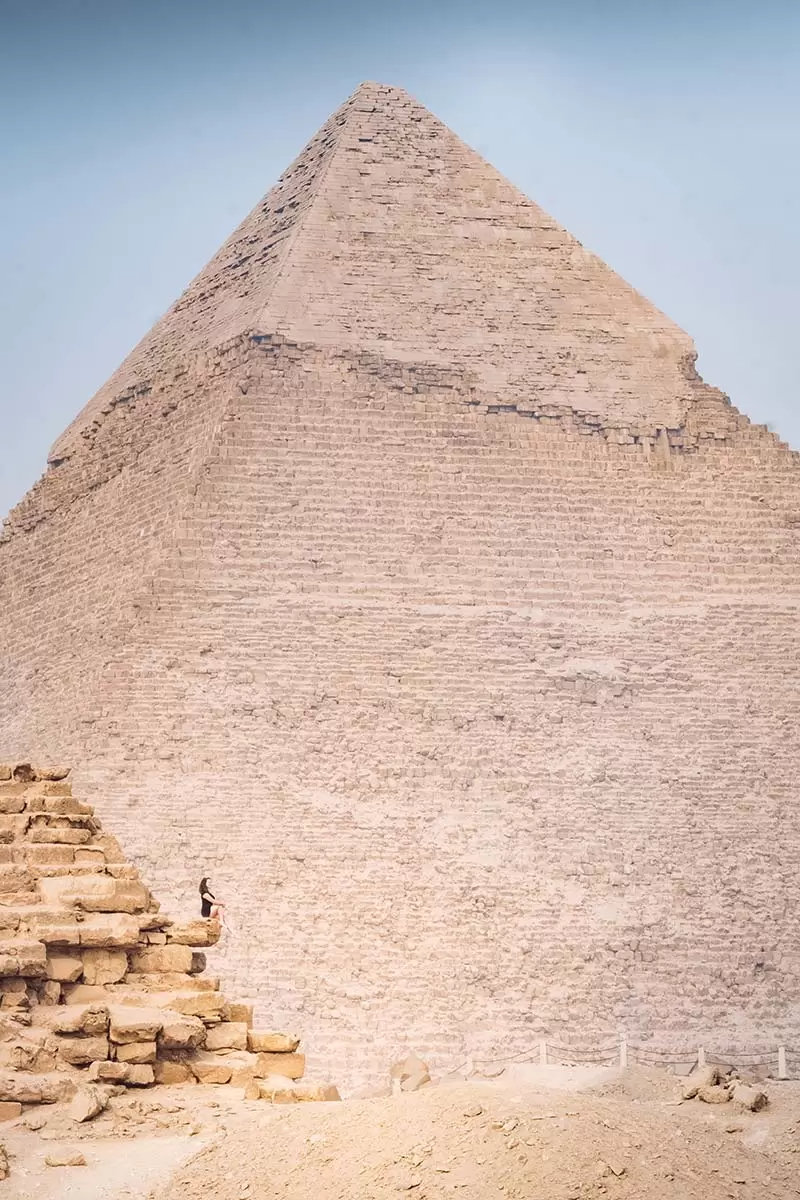
You will have to pay a small fee to take your camera inside the Pyramids Complex
Want to take your camera with you? Be prepared to pay for it!
Whether you want to take photos or film video, every monument, temple, tomb and museum you visit will charge a small fee just to take it inside. Expect to pay anything from 50 to 100 EGP (2.70 – 5.60 USD).
I was even charged extra when guards are Philae temple saw my tripod. At first they wouldn’t let me take it at all then they came around when I said I wouldn’t use it so they charged me for another camera ticket.
Once inside, flash photography is generally forbidden and should be strictly followed.
19. Camel Rides
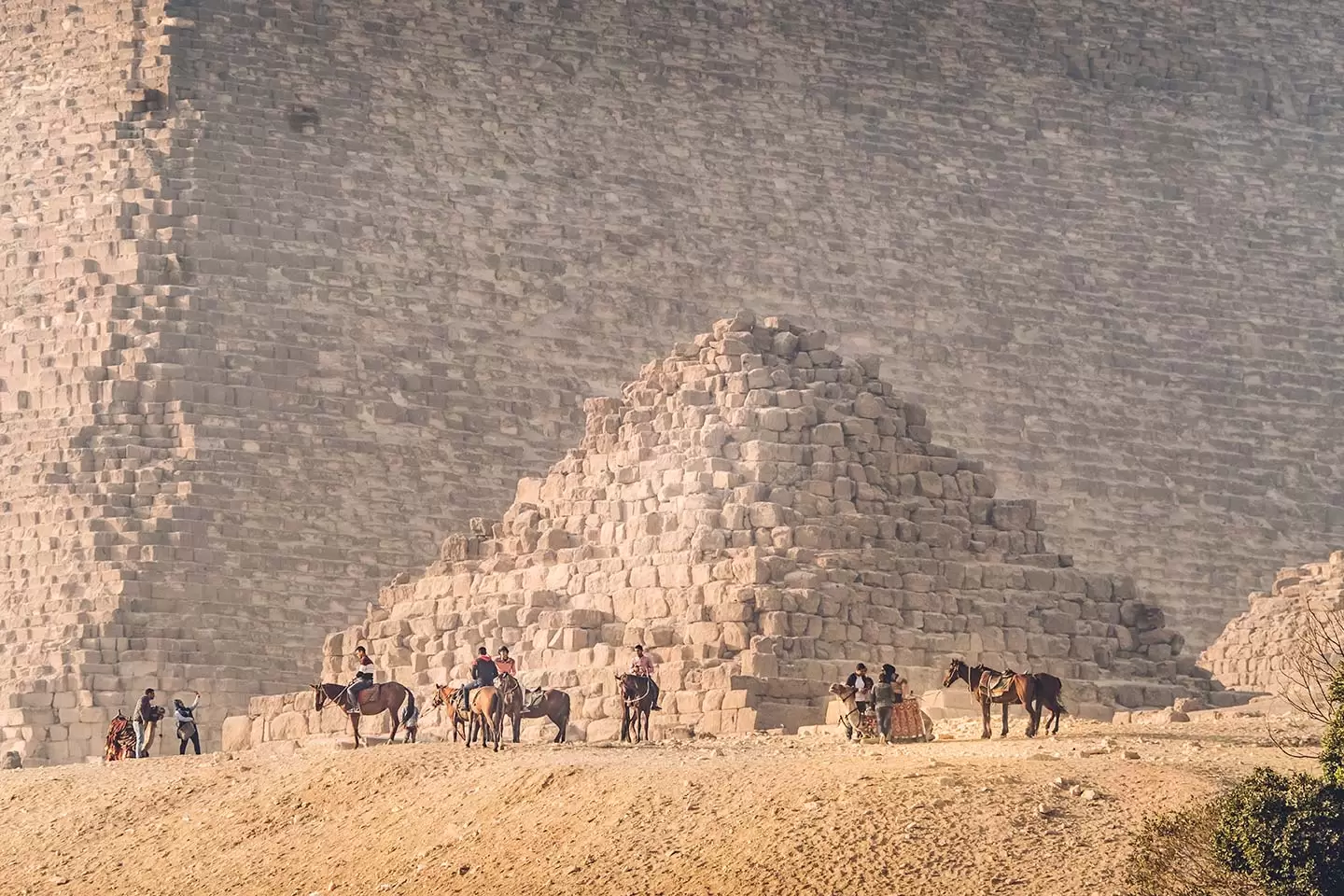
Camel and horse rides at the Pyramids of Giza
Going on a camel ride and taking a photo with the pyramids behind you is one of the most desired tourist souvenirs from a trip to Egypt.
If you know that going on a camel ride around the pyramids is something you definitely want to do, you may (and I hope), reconsider once you arrive and see how malnourished and badly treated the camels, and horses for that matter, are.
Egypt is a third-world country and many citizens are living in a state of desperation. As such, the men who run these camel rides prioritise feeding their families over feeding their camels. While they may have their priorities right, I can’t bring myself to support them. This has only become worse since tourism has declined.
If you do choose to take a camel ride, make sure you’re not hassled into paying more than the fair price. In order to crack down on scamming tourist signs have now been put up showing set prices for camel rides which are 50 Egyptian Pounds for 30 minutes.
Make sure you check out my guide on everything you need to know about visiting the Pyramids.
20. Toilets
Public toilets in Egypt are not the best, and that’s putting it lightly.
A trip to the loo will set you back 1 or 2 EGP and give you access to either a squat or western toilet. They generally don’t have toilet paper, are dirty, and the tap water may not be running. Bring your own toilet paper (these flushable wipes are great), hand sanitizer, and wipe down the seat if you must sit or get one of these.
There will usually be a hose next to the toilet, but the water will only be turned on if you pay a baksheesh.
Toilets in restaurants and hotels are usually staffed by an attendant who will give you toilet paper and turn on the tap for you. Giving a baksheesh of 25 – 50 piastres is standard.
21. School Children
You might feel famous when travelling around Egypt. At least that’s how the students in large school groups will make you think,
On countless occasions, at the Egyptian Museum in Cairo, the Pyramids, and Karnak Temple, young kids would run up to us asking for selfies or yell out and wave as our group walked passed. They were so excited and interested in us.
When I asked Ramzy why, he said that we are sort of celebrities to them. They watch people like us on TV who have very different lives from their own so they get excited when they see us in their country.
It’s actually very sweet. However, if you say yes to one, they’ll all come running. It’s best to politely decline from the start.
22. Mosques and Religious Sites
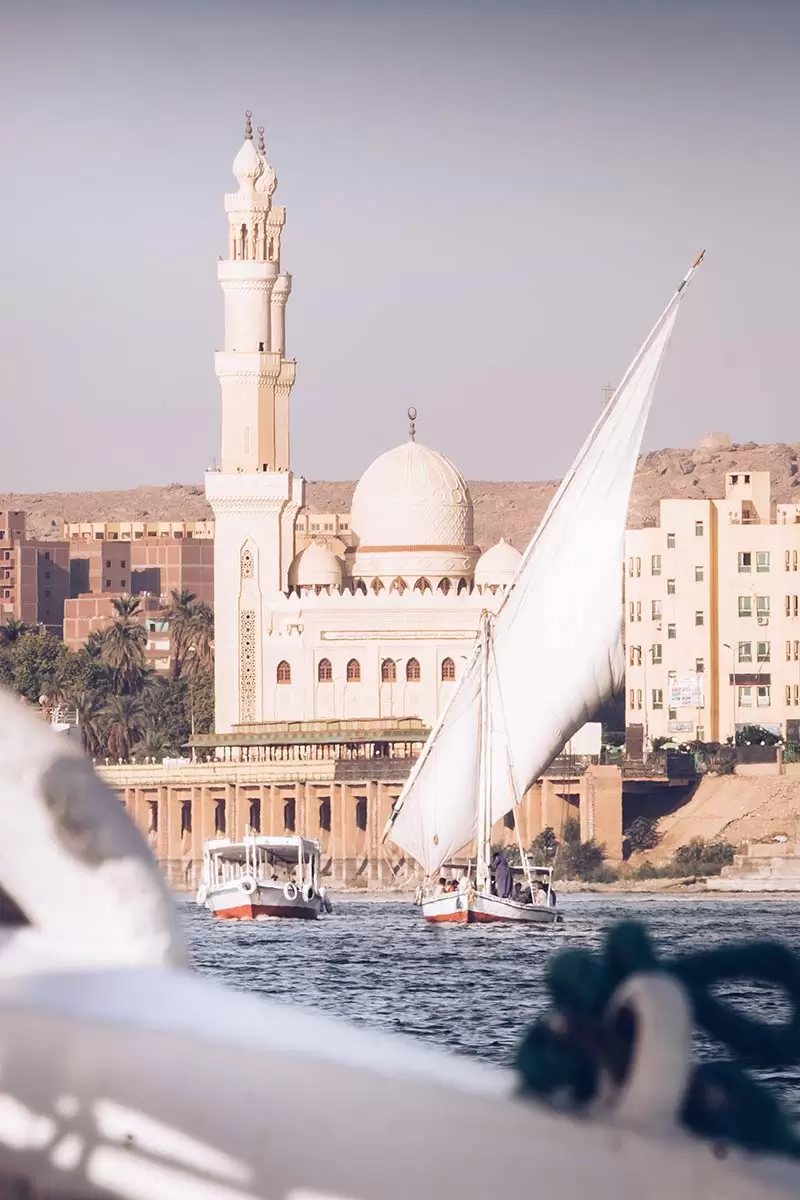
A beautiful Mosque on the Nile
Dressing modestly is a must when visiting mosques. Some places may ask women to cover their hair and will provide you with a headscarf. Before entering you will be required to remove your shoes and leave them with a shoe custodian (give him a baksheesh).
If you want to climb the minaret (tower), carry your shoes with the soles pressed together. It’s best to avoid visiting mosques during prayer times as to not intrude on worshippers.
23. Smoking
Everywhere you go, everyone will be smoking. Whether it’s a cigarette or shisha water-pipe, if you’re a non-smoker it can get really annoying.
Smokers are allowed to light up pretty much anywhere. The only exception is in fast-food restaurants thanks to an initiative by the environment ministry.
Restaurants have non-smoking tables, but these are almost pointless since they are surrounded by smoking tables. If you’re outside, try and stay upwind and always ask for a non-smoking room in your hotel.
24. Fridays and Saturdays
As in most Arab countries, their weekend falls on a Friday and Saturday. This means tourist attractions are much more busy on these days than the rest of the week.
I strongly recommend not visiting the Pyramids, Cairo Tower or the Egyptian Museum in Cairo on either of these days. The queues will be torture.
25. BONUS TIP: Fake Papyrus Scam
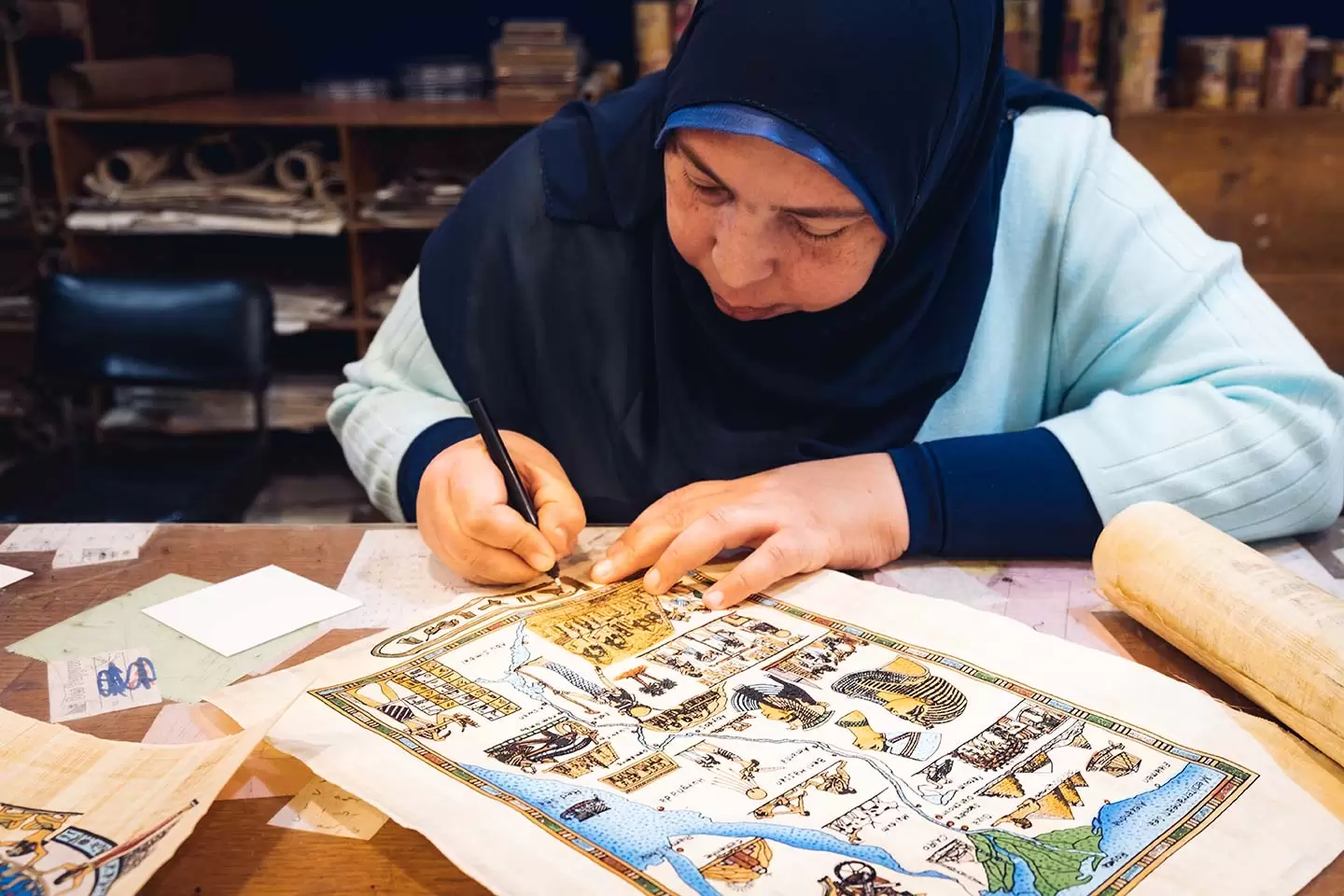
Lady writing my name in hieroglyphics on real papyrus
The Ancient Egyptians were one of the first to master the production of paper, known as papyrus. One of the nicest souvenirs you can get after a trip to Egypt is a papyrus print. But, there is a very common scam take catches out many tourists. Fake papyrus!
In many markets and other street vendors will sell fake papyrus that is actually made from banana leaf, not the papyrus plant. These will be cheaper than the real thing.
So, how do you spot a fake papyrus? Easy! First, notice how these vendors show or display their “papyrus”, it’s stiff, like cardboard and will tear when rolled which is why they’ll never roll it. Real papyrus is strong, flexible and durable and can be rolled up. Second, hold the papyrus up to the light, you should be able to see vertical and horizontal strips that make up the papyrus sheet, within these strips you should see little dark fibres or flecks. This is a good sign!
Conclusion
I hope this guide has helped you feel more prepared for your trip to Egypt. Remember, every country has its quirks. If things were the same as home, you wouldn’t be visiting.
I would go back to Egypt in a heartbeat. Everything I saw blew me away. It’s such an incredible country with a wonderful history. The locals are welcoming and it’s very cheap to travel to.
If you still have any questions or concerns, please reach out and leave a comment below. I’d be happy to help where I can. If not, then I wish you a wonderful trip! Support this blog and book your Egypt tour here.
Shukran for reading! ;)
Take a day trip from Cairo
-
-
- Alexandria Day Tour: See the city built by Alexander the Great
- Private Full-Day Tour of Historical Alexandria from Cairo
- Pyramids of Giza, Sakkara & Memphis: Private Tour with Lunch
- Pyramids, Museum & Bazaar Private Tour with Entrance & Lunch
- Cairo: Dinner Cruise on the Nile River with Entertainment
- Cairo: Egyptian Museum 4-Hour Private Tour with Transfer
- Cairo: 1 or 2-Hour Felucca Ride on the Nile with Transfers
- Old Cairo and Khan El Khalili Bazaar: Private Half-Day Tour
- Cairo: Best Kept Secrets Night Tour
- Plus loads more here…
-
Planning a trip and need travel insurance? Get a free quote from World Nomads here.
Let me remind you again why Egypt is amazing and watch my Egypt vlog below.
Going to Egypt? Get my free Arabic travel phrase guide.
Like it? Pin it for later
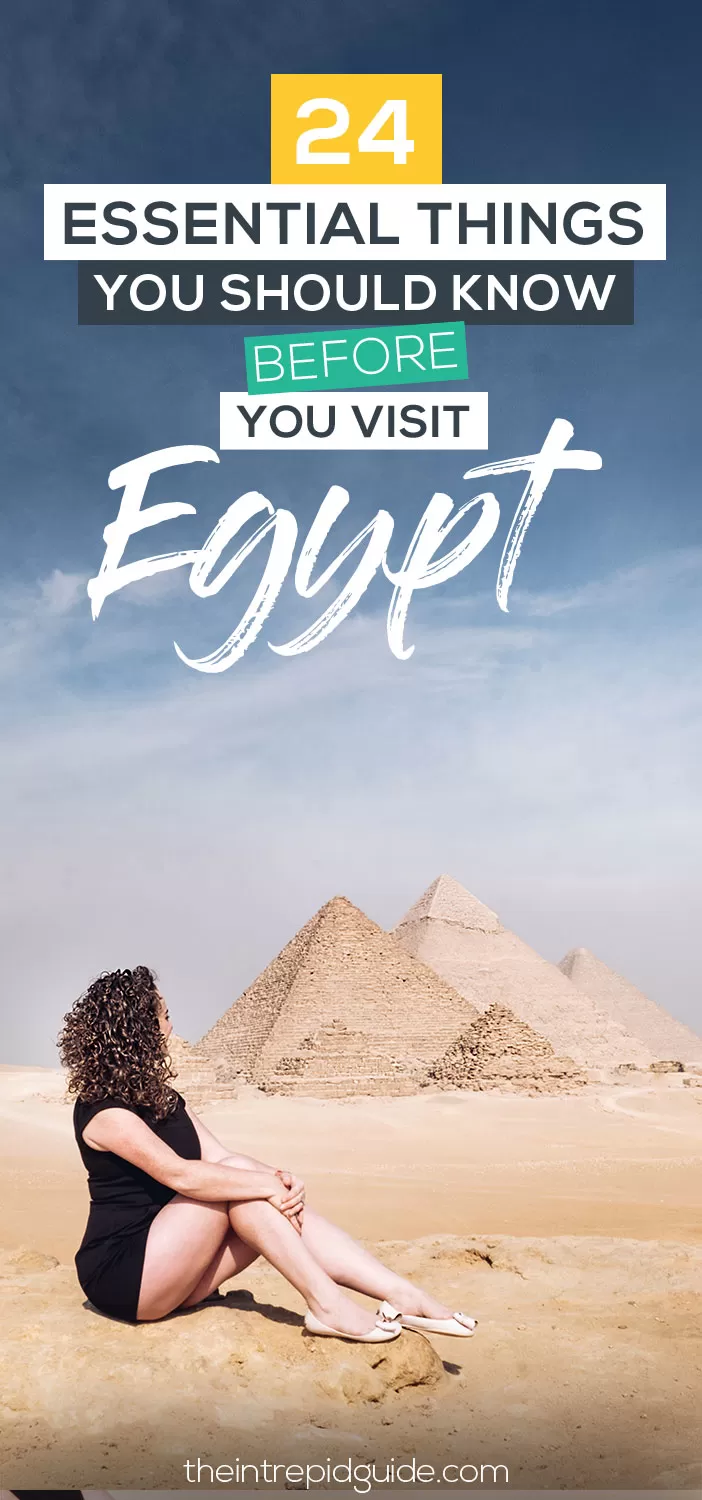
Sources
Eyewitness Egypt
Over to you!
Which of these tips did you find the most useful? Is there anything you would add? Tell me below!
Let me know using the comments section below or join me on social media to start a conversation.
Thanks for reading and I hope you enjoyed this post.
Like what you see? Subscribe using the form below to have all of my posts delivered directly to your email.

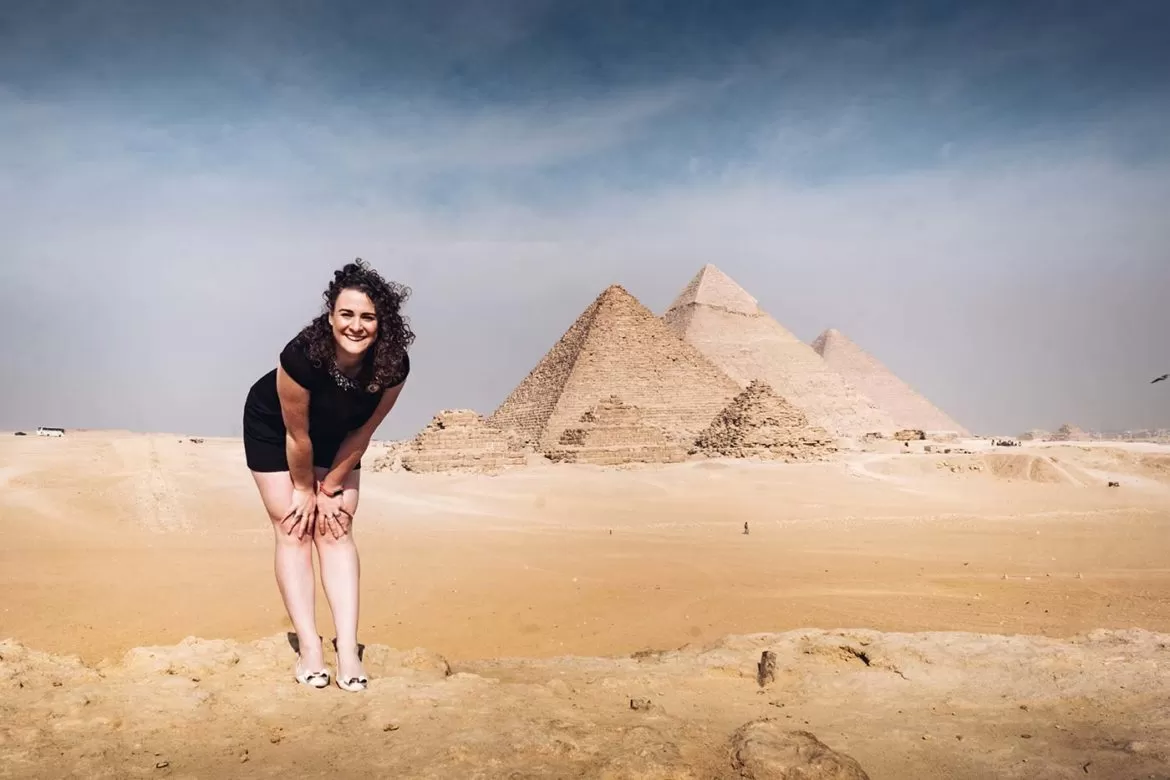
17 comments
Thank you so much for all the information.
Looking forward for a trip to Egypt !!
My pleasure! Have a wonderful trip :)
Hi Michele, a lovely and useful article to read! Just wanted to check with you about passport safety: was it with you at all times, or you left it in your hotel room? Also – when entering Egypt have you been questioned about what, if any medication you had with you – as some over the counter meds in Europe or US can be problematic to bring into Egypt? Thank you!
Hi Jo, thank you so much and thank you for your questions. Yes, I always carried my passport on me. In fact, I do this wherever I travel. I would also ensure you have a photocopy in your luggage and a copy saved on your phone or on the cloud as an extra safety measure. When it comes to medication, I would email the airport directly for any questions you have. I was worried when flying from London to NY after I had heard that you can’t take a certain quantity of protein powder in your luggage. I emailed US customs and they said it was ok. I also kept a copy of that email on me and on my phone and was ready to show the customs officers on arrival if I had any issues. This is good practice as the problem with customs is that it’s sometimes open to interpretation and depends on how the officers feel on the day. I hope this helps :) Have a wonderful trip!
Where do you recommend converting US $$ to LE and what volume of notes should I get to handle all the tipping. If at airport, is this best done before the border/customs or after? Thanks!
Hi David, before arriving, I ordered some USD so I would have enough to pay for my visa on arrival and have some money for incidentals. I had heard that they accept both USD and Egyptian Pounds at the airport. The tour company I travelled with had a guide on the ground who helped me through this process and I knew I need 100USD to pay for the visa. The rest of the time I used Egyptian Pounds. There is no tipping culture like the USA, so you can tip if you like but it’s not always necessary.
Hi David, before arriving, I ordered some USD so I would have enough to pay for my visa on arrival and have some money for incidentals. I had heard that they accept both USD and Egyptian Pounds at the airport. The tour company I travelled with had a guide on the ground who helped me through this process and I knew I need 100USD to pay for the visa. The rest of the time I used Egyptian Pounds. There is no tipping culture like the USA, so you can tip if you like but it’s not always necessary.
Hi, I have read and re-read this several times. Thank you. I’m going with a friend to Egypt early March and want to go on organised trips but I’m disabled and can only walk very slowly. In other countries I’ve just let the group go ahead and done my own thing then joined back at the coach. Is this a good idea in Egypt or can I hire an electric mobility scooter while there.
Hi Gabrielle, I’m not 100% sure how this works and it will vary depending on the accessibility of the group tour company. I would reach out to them directly for advice before booking. Best of luck and I hope it works out :)
Hello, thank you for your honesty. I enjoyed reading all of your tips. I am considering going in February from the 19th to the 24th. Do you think this is enough time to see everything you saw?
Hi Caroline, I went on a Top Deck tour, this is the best way to ensure you that we see everything and safely too. I highly recommend it. You can see the tour I did here http://bit.ly/EgyptExpressTour
Great info! Where did you take your photos??? THEY. ARE. FABULOUS.
Thank you SO much, Naomi. I took them during my Top Deck tour around Egypt. I highly recommend it! :)
This has been helpful and has eased my mind about travelling to Egypt. Going in a tour group, can’t wait ! :D
I’m so happy to hear that. You’re very welcome, Jacinda :)
Thank you so much for such a wonderful article, I can’t wait to land egypt.
Thank you so much, Priya :)